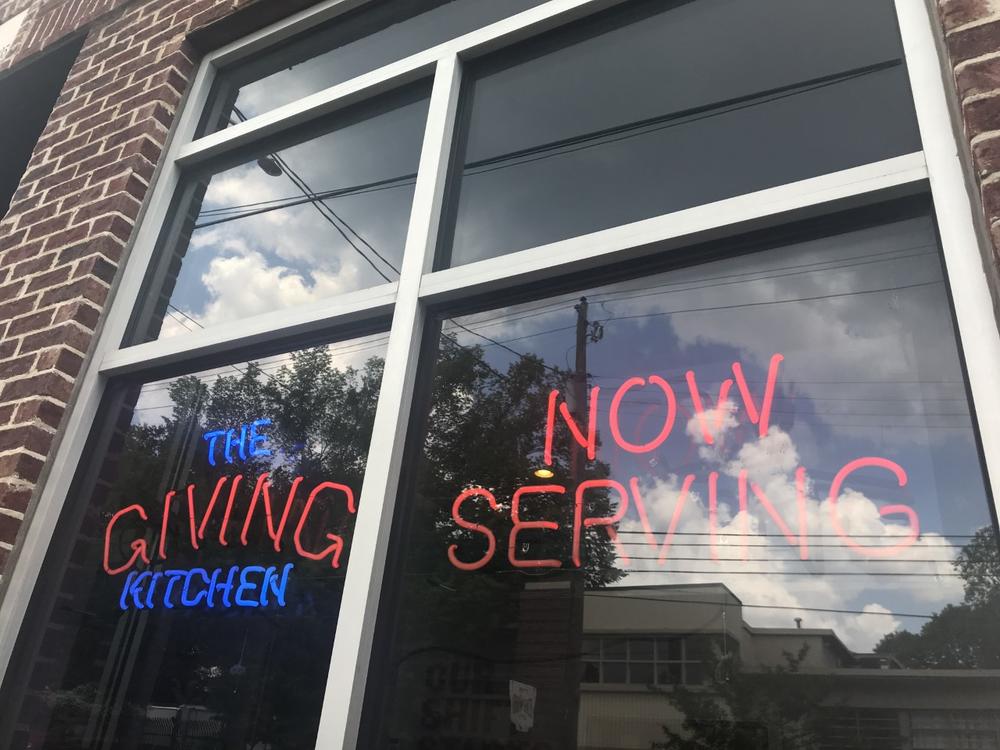Section Branding
Header Content
With The Food Service Industry In Crisis, Giving Kitchen Steps In To Help
Primary Content
Working in the food service industry can be a tough gig, even without a pandemic. Many workers are uninsured and — like the restaurants employing them — have little financial cushion for weathering crises.
Since 2013, Giving Kitchen has helped bolster the industry by providing crisis grants, resources, and assistance to food service workers. But now, with restaurant closures and many folks out of work, more food industry employees find themselves in crisis than ever before — an insurmountable challenge for the small Atlanta-based nonprofit. "On Second Thought" host Virginia Prescott speaks with Bryan Schroeder.
Bryan Schroeder, Giving Kitchen's executive director, joined On Second Thought to discuss the sudden and serious threats facing the industry and its workers — and how they are responding.
"This is an incredibly tough time," he explained. "There are people who are in pain that is really incomprehensible. And, you know, you're almost looking at a 90% unemployment rate with food service workers across Georgia."
Giving Kitchen found itself making a tough decision: they could not expand their services to serve every unemployed or underemployed food industry worker in the state. That, Schroeder explained, would have only led to failure.
"If we had tried to go big, essentially, and help hundreds of thousands of people with the millions of dollars of need, we would have failed," he said. "And in failing, we would have also failed the people whom we've helped the past few weeks."
The folks they have been able to help are all impacted by lacking work and something else. Some, he explained, have symptoms of coronavirus, while others are on mandatory quarantine because of immunodeficiencies or perhaps even a recent transplant, making them more susceptible to suffering severe complications from COVID-19.
And, Giving Kitchen is also applying its resources to folks who, in addition to unemployment due to coronavirus, are facing crises that have nothing to do with the pandemic at all.
"Over the past three weeks, during all this chaos, we've been able to provide $65,000 in financial assistance to about 45 food service workers in crisis," Schroeder said. "And now these are people who are all impacted by COVID-19. And on top of that, they've had a loved one in ICU or they've been in a car accident, or they've been diagnosed with lymphoma, or they've had multiple strokes. And one server whose premature baby is still in NICU."
Giving Kitchen has also compiled a resource page that provides information on housing, financial assistance, telehealth options and more. It helps identify local institutions that are providing meals for out-of-work food service employees.
Schroeder is quick to point out that the industry as a whole will need support from the community. That includes ordering takeout — and tipping well — while going out to support the industry once lockdowns and shelter-in-place orders end.
"When this thing opens back up, we need to give it as much of our love and attention as possible," he said. "I mean, I've told people: when food service comes back online, it's going to be like Mardi Gras every night of the week at my house. We're going to go eat and drink and tip and celebrate."
INTERVIEW HIGHLIGHTS
On the struggles for the food service industry and its workers during the coronavirus pandemic
This is an incredibly tough time. There are people who are in pain that is really incomprehensible. And, you know, you're almost looking at a 90 percent unemployment rate with food service workers across Georgia. And many restaurants have had to make the really tough decisions. Many restaurants and food service organizations were making decisions about laying off their employees or keeping employees without knowing what the state and federal government response was going to be. And in some ways, you know, laying off their employees may have ended up being a better option than reducing hours because they're able to qualify for financial assistance from the state or federal government.
On why Giving Kitchen cannot provide grants for workers who are experiencing unemployment or underemployment alone
We were challenged in the early days of this crisis when we realized that hundreds of thousands of food service workers would go unemployed. Both externally and internally, we were questioned. You know, should we do something about this? Can Giving Kitchen step in? And ultimately, we came to the decision that we need to stick to what we do best. We need to trust in our community and trust in the state government and the federal government to help with unemployment. Because if we had tried to go big, essentially, and help hundreds of thousands of people with the millions of dollars of need, we would have failed. And in failing, we would have also failed the people who we've helped the past few weeks.
On how Giving Kitchen is providing support for those immediately impacted by coronavirus, and is planning for the long-term needs of the industry
We’ve had about 15 people who we've provided financial assistance, who either have COVID-19 or who have symptoms similar to COVID-19. But we've also helped people who have children who have compromised immune systems and they’re restaurant workers and they need to stay home. We've also helped restaurant workers who've had transplants. And because they've had a transplant, they're highly susceptible to COVID-19. And we anticipate that's going to continue to go up. And also, you know, when we look ahead to some kind of a new normal this summer, this fall, we know that the health of a food service worker is scrutinized more than ever. We know that there's going to be food service workers who are sent home — maybe for weeks — just because they had the common cold. And so we know that, not just today in the face of this crisis as it emerges, but over […] the next year, as we learn to live with COVID, Giving Kitchen’s going to continue to be a really important resource for food service workers learning to live with this.
On maintaining the health of the food service industry at large
It's going to be a blocking and tackling affair — restaurant by restaurant, business by business. How can they keep cash flow to the place where they can relaunch and reboot? And I would say all of food service — not just small business, but big business, too. And when this thing opens back up, we need to give it as much of our love and attention as possible. I mean, I've told people: when food service comes back online, it's going to be like Mardi Gras every night of the week at my house. We're going to go eat and drink and tip and celebrate. But I think this is a really tough time. But what I've seen from my perspective is people have really come together to support each other — at the individual scale, but also on the restaurant scale — and how restaurants support each other. It's going to be really tough; you know, I don't want to sugarcoat it.
Get in touch with us.
Twitter: @OSTTalk
Facebook: OnSecondThought
Email: OnSecondThought@gpb.org
Phone: 404-500-9457



